
Johann Baptist Joseph Maximilian Reger was a German composer, pianist, organist, conductor, and academic teacher. He worked as a concert pianist, as a musical director at the Leipzig University Church, as a professor at the Royal Conservatory in Leipzig, and as a music director at the court of Duke Georg II of Saxe-Meiningen.

Henri Marteau was a French violinist and composer, who obtained Swedish citizenship in 1915.
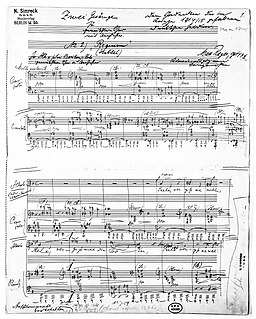
Max Reger's 1915 Requiem, Op. 144b, is a late Romantic setting of Friedrich Hebbel's poem "Requiem" for alto or baritone solo, chorus and orchestra. It is Reger's last completed work for chorus and orchestra, dedicated in the autograph as Dem Andenken der im Kriege 1914/15 gefallenen deutschen Helden.

"Rastlose Liebe" is a Lied composed by Franz Schubert and published in July 1821 as Op. 5, No. 1. In Otto Erich Deutsch's catalog it is D138. The song, dedicated to Anton Salieri, is based on a text by Johann Wolfgang von Goethe, written during a snowstorm in the Thuringian Forest.
Hermann Reutter was a German composer and pianist who worked as an academic teacher, university administrator, recitalist, and accompanist. He composed several operas, orchestral works, and chamber music, and especially many lieder, setting poems by authors writing in German, Russian, Spanish, Icelandic, English, and ancient Egyptian and Greek, among others.

"Traum durch die Dämmerung", is both a German poem by Otto Julius Bierbaum and a Lied by Richard Strauss, his Op. 29/1. The opening line is "Weite Wiesen im Dämmergrau". It is the first of three songs by Strauss based on love poems by Bierbaum, composed and published in Munich in 1895, and dedicated to Eugen Gura. The works were scored for medium voice and piano, and published by Universal Edition as 3 Lieder mit Klavierbegleitung, later with English versions and orchestral arrangements.
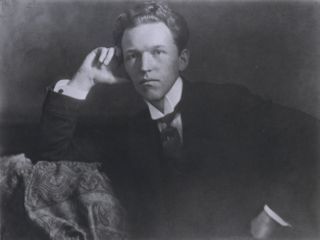
Sigwart Botho Philipp August zu Eulenburg, Count of Eulenburg was the second son of Philipp, Prince of Eulenburg (1847–1921) and his wife Augusta, born Countess of Sandels (1853–1941) and a German late romantic composer who fell in the First World War.

"Ständchen" ("Serenade") is an art song composed by Richard Strauss in 1886, setting a poem of the same title by the German poet Adolf Friedrich von Schack. It is the second song in his collection Six songs for high voice and piano, Op. 17, TrV 149, which were all settings of Schack poems. The song is written for voice and piano.

Der Mensch lebt und bestehet, Op. 138, No. 1, is a sacred motet for unaccompanied mixed choir by Max Reger. The German text is a poem by Matthias Claudius, beginning with "Der Mensch lebt und bestehet nur eine kleine Zeit". The piece is in A minor and scored for eight voices in two choirs SATB. Composed in Meiningen in 1914, it was published in 1916 after Reger's death as the first of Acht geistliche Gesänge.

Nachtlied Op. 138, No. 3, is a sacred motet for unaccompanied mixed choir by Max Reger. The German text is a poem by Petrus Herbert, beginning "Die Nacht ist kommen". The piece is in B minor and scored for five voices SATBB. Composed in Meiningen in 1914, it was published in 1916 after Reger's death as the third of Acht geistliche Gesänge.

Gesang der Verklärten, Op. 71, is a composition by Max Reger for a mixed five-part choir and orchestra, a late Romantic setting of a poem by Carl Busse. Reger composed the work in 1903. He dedicated it to "Meiner geliebten Frau Elsa". It was published in 1905 and first performed in Aachen on 18 January 1906 by the municipal choir and orchestra, conducted by Eberhard Schwickerath.

Sechs Lieder, Op. 4, is a set of six Lieder for medium voice and piano by Max Reger. He composed them in Weiden and Wiesbaden between 1890 and 1892, and dedicated them to Elisabeth Riemann. They were published by Augener & Co. in London.
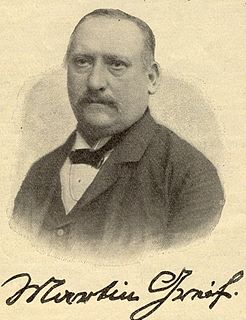
Martin Greif, born Friedrich Hermann Frey was a German freelance writer of poems and of dramas which were performed at the Burgtheater in Vienna and the Bavarian Court Theatre in Munich. His songs inspired compositions by Max Reger and Alban Berg, among others.

"An die Hoffnung", Op. 124, is a Lied for alto or mezzo-soprano and orchestra by Max Reger, setting a poem by Friedrich Hölderlin. He composed it in Meiningen in 1912 and dedicated it to Anna Erler-Schnaudt, the singer of the first performance. It was published by Edition Peters the same year.

"Freundliche Vision" is both a German poem by Otto Bierbaum and a Lied by Richard Strauss, his Op. 48/1. The opening line is "Nicht im Schlafe hab ich das geträumt". It is the first of a set of five songs by Strauss composed in 1900 and published in Berlin in 1901 by Adolph Fürstner. The works were scored for voice and piano, and arranged for voice and orchestra in 1918 by the composer.
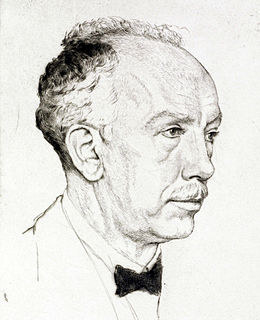
Sechs Lieder, Op. 68, is a collection of six Lieder by Richard Strauss. He composed them, setting poems by Clemens Brentano, in 1918 for soprano and piano, and orchestrated one in 1933 and five in 1940. The piano version was first published by Adolph Fürstner in Berlin in 1919. They are also known as Brentano Lieder.
Sechs Lieder may refer to:
August Reuß was a German composer.
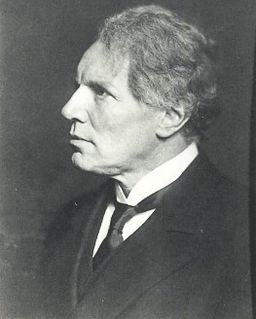
Ludwig Wüllner was a German concert and operatic tenor, as well as an actor and narrator. He is regarded as one of the most versatile and important stage performers of his time.















